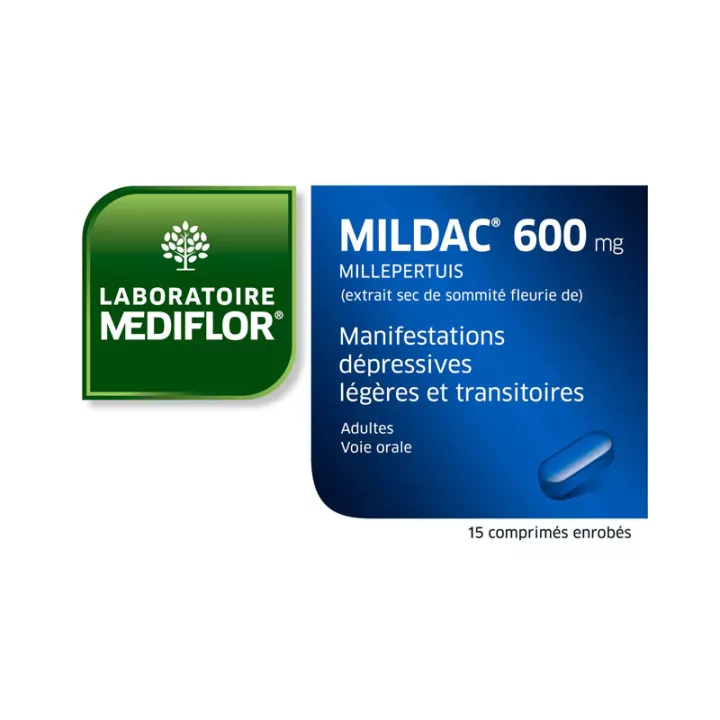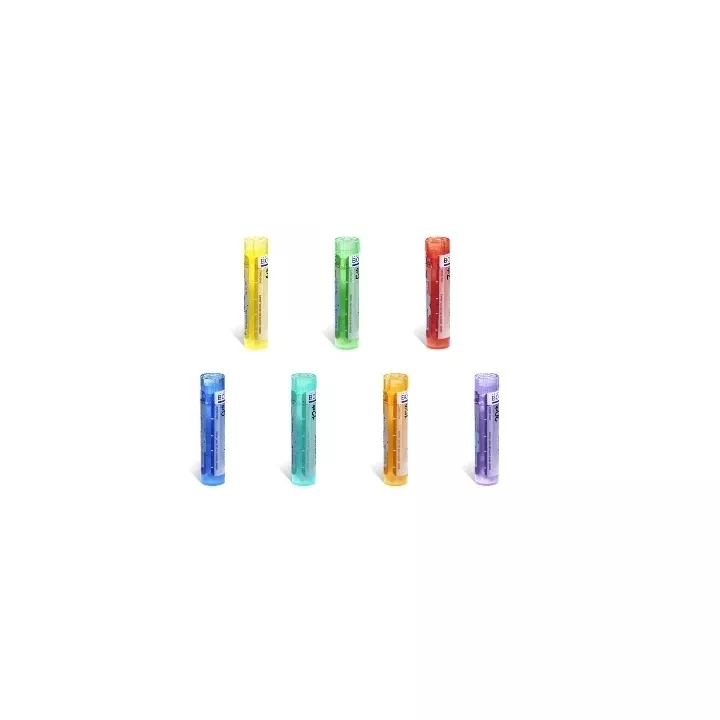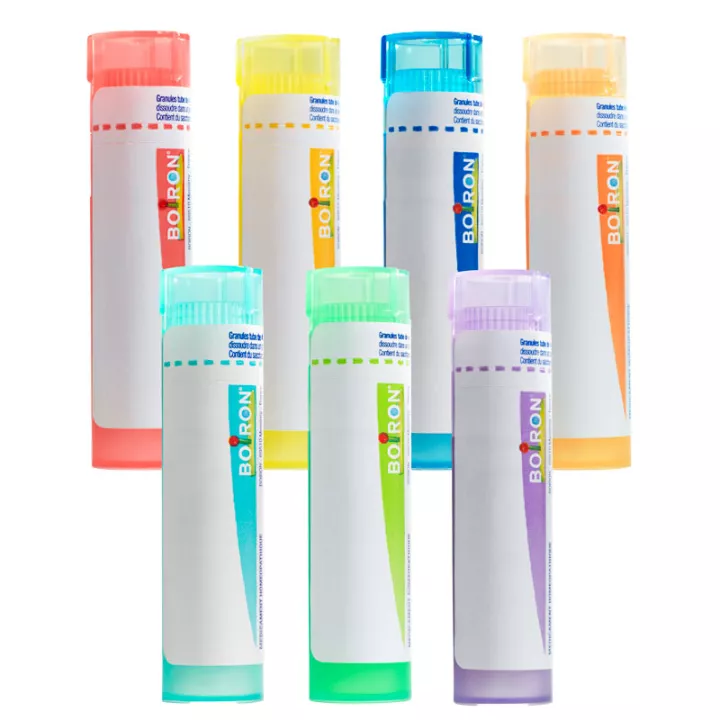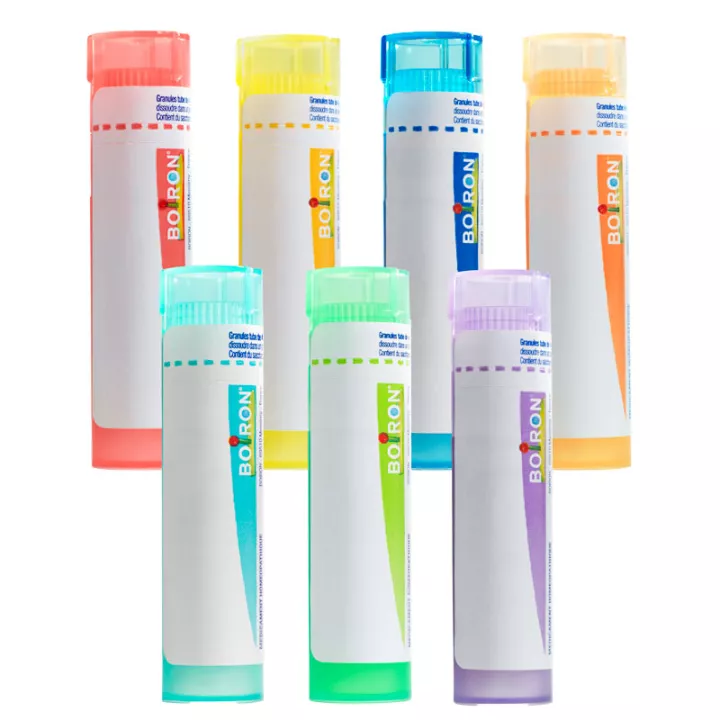NOTICE
ANSM - Last updated: 12/10/2016
Name of the medicinal product
MILDAC 600 mg coated tablet
St. John's wort (dry extract)
framed
Please read this leaflet carefully before you start taking this medicine because it contains important information for you.
You should always take this medication exactly as prescribed in this leaflet or by your doctor or pharmacist.
· Keep this leaflet. You might need to read it again.
· Ask your pharmacist for advice or information.
· If you experience any of the side effects, talk to your doctor or pharmacist. This also applies to any side effects not mentioned in this leaflet. See section 4.
· You should contact your doctor if you experience no improvement or if you feel less well 15 days.
Do not use this medication for children.
What is in this leaflet?
1. What is Mildac 600 mg, coated tablet and in which cases it is used?
2. What should I know before taking Mildac 600 mg coated tablet?
3. How to take Mildac 600 mg, coated tablet?
4. What are the possible side effects?
5. How to store Mildac 600 mg coated tablet?
6. Package contents and other information.
1. WHAT IS MILDAC 600 mg coated tablet AND WHAT IT IS USED FOR?
Pharmacotherapeutic group - ATC code: Herbal medicinal product
Herbal medication traditionally used in the treatment of mild and transient depressive manifestations.
You should contact your doctor if you experience no improvement or feel less well after 15 days.
2. BEFORE YOU TAKE MILDAC 600 mg, coated tablet?
Do not take MILDAC 600 mg, coated tablet:
· if you are allergic (hypersensitive) to the active substance or to any of the other ingredients of this medication mentioned in section 6.
· In combination with anti-coagulants, anti-epileptics, contraceptives (estrogens and progestins), digoxin (used to treat heart disease), immunosuppressants (used for organ transplantation), protease inhibitors used in the treatment of HIV infection), cobicistat, daclatasvir, ledipasvir and dasabuvir (used in the treatment of hepatitis C), tyrosine kinase inhibitors (used in the treatment of certain cancers) (antimycotic), itraconazole and voriconazole (antifungal), lurasidone (used in schizophrenia), oxycodone (analgesic), rilpivirine (used in the treatment of certain cancers) theophylline and aminophylline (used in the treatment of asthma and certain respiratory diseases), ticagrelor (platelet anti-agregant), vismodegib (used in (see section "Other medicines and MILDAC 600 mg, coated tablet"), verapamil (used in the treatment of heart disease).
Warnings and Precautions
Talk to your doctor or pharmacist before taking MILDAC 600 mg coated tablet .
It is necessary that you take a medical opinion before starting treatment if you are being treated with other medicines (see section "Other medicines").
The antidepressant properties of MILDAC 600 mg coated tablets usually appear within the first 4 weeks after initiation of therapy. If symptoms persist, it is necessary to consult your doctor.
Use in children under 18 years is not recommended due to the lack of sufficient data.
Avoid prolonged exposure to the sun during treatment, due to the risk of skin reactions resembling sunburn (photosensitivity).
If you have to undergo surgery, tell your doctor if you are taking MILDAC 600 mg coated tablet.
Other medicines and MILDAC 600 mg, coated tablet
Inform your doctor or pharmacist if you are taking or have recently taken or may be taking any other medicines.
Inform your doctor or pharmacist if you are taking or have recently taken or may be taking any other medicines, MILDAC 600 mg, coated tablet may cause a decrease in the therapeutic effect of other medicines.
MILDAC 600 mg, coated tablet should not be taken with anticoagulants, antiepileptics, contraceptives (estrogen-progestin and progestin), digoxin (used to treat heart disease), immunosuppressants (used for organ transplants) protease inhibitors (used in the treatment of HIV infection), cobicistat, daclatasvir, ledipasvir and dasabuvir (used in the treatment of hepatitis C), tyrosine kinase inhibitors (used in the (antimycotic), itraconazole and voriconazole (antifungal), lurasidone (used in schizophrenia), oxycodone (analgesic), rilpivirine (used in the treatment of certain cancers) in the treatment of HIV infection), theophylline and aminophylline (used in the treatment of asthma and certain respiratory diseases), ticagrelor (anti-aggregating p vismodegib (used in the treatment of certain cancers), verapamil (used in the treatment of heart disease).
Inform your doctor or pharmacist if you are taking a drug containing any of the active ingredients:
· baedaquilin (used to treat tuberculosis)
· carbamazepine (used to treat epilepsy)
· cyproterone (used to treat certain hormonal diseases),
· dolutegravir (used to treat HIV)
· dronedarone and propafenone (used to treat heart rhythm disorders),
· eribulin (used in the treatment of certain cancers)
· idelalisib (used in the treatment of certain cancers)
· ivabradine (used to treat angina),
· lomitapide (used in some cases of familial hypercholesterolemia)
· macitentan (used in the treatment of pulmonary arterial hypertension)
· maraviroc (used in the treatment of HIV)
· quetiapine (used in the treatment of schizophrenia)
· siméprévir (used in the treatment of hepatitis C)
· simvastatin (used in the treatment of hypercholesterolemia or dyslipidemia)
· sofosbuvir (used in the treatment of hepatitis C)
· telithromycin and linezolid (antibiotics)
· ulipristal (emergency contraceptive).
If your doctor prescribes other medicines for depression, tell your doctor that you are already taking MILDAC 600 mg coated tablets.
MILDAC 600 mg, tablet coated with food, drinks and alcohol
Not applicable.
Pregnancy and breast feeding
If you are pregnant or breastfeeding, think you may be pregnant or plan a pregnancy, ask your doctor for advice or to your pharmacist before taking any medication.
Sport
Not applicable.
Driving and using machines
Not applicable.
MILDAC 600 mg, coated tablet contains
Not applicable.
3. HOW TO TAKE MILDAC 600 mg coated tablet?
Always take this medication exactly as prescribed by your doctor or pharmacist. Check with your doctor or pharmacist if you are not sure.
Reserved for adults (from 18 years) and the elderly.
Always take this medication exactly as prescribed in this leaflet or as directed by your doctor or pharmacist. Check with your doctor or pharmacist if you are not sure.
The recommended dose is 1 tablet per day, preferably in the morning.
If you take more than Mildac 600 mg, coated tablet you should:
Immediately consult your doctor or pharmacist.
If you forget to take Mildac 600 mg, coated tablet:
Do not take a double dose to make up for the missed dose .
If you stop taking Mildac 600 mg, coated tablet:
Not applicable.
If you have any further questions on the use of this medication, ask your doctor or pharmacist.
4. WHAT ARE POSSIBLE SIDE EFFECTS?
Like all medicines, this medicine may cause side effects, although not everybody gets them.
Like all medicines, Mildac 600 mg, coated tablet is likely to have side effects, although not everyone is subject to it.
Digestive disorders, fatigue, agitation or rash may occur. Possibility of excessive sensitivity to sunlight (photosensitivity) with skin reactions resembling sunburn in case of sun exposure during treatment.
Declaration of side effects
If you experience any side effects, talk to your doctor or pharmacist. This also applies to any side effects not mentioned in this leaflet. You can also report adverse reactions directly via the national reporting system: National Agency for the Safety of Medicines and Health Products (ANSM) and network of Regional Centers of Pharmacovigilance - Website: www.ansm.sante.fr
By reporting adverse reactions, you are helping to provide more information about the safety of the drug.
5. HOW TO STORE MILDAC 600 mg coated tablet?
Keep this medicine out of the reach and sight of children.
Do not use this medicine after the expiry date which is stated on the package. The expiry date refers to the last day of that month.
Do not use this medication if you notice any signs of deterioration.
Do not throw any medicines into drains or rubbish. Ask your pharmacist to remove any medications you are no longer using. These measures will help protect the environment.
6. PACKAGE CONTENTS AND OTHER INFORMATION
What MILDAC 600 mg contains: coated tablet
· The active substance is:
St. John's wort ( Hypericum perforatum L.) (methanolic dry extract (80% V / V)) 612 mg
· The excipients are: ascorbic acid, microcrystalline cellulose, croscarmellose sodium, iron oxide (E172), hypromellose, stearic acid, magnesium stearate, sodium saccharin, precipitated silica, titanium dioxide (E 171), vanillin.
What Mildac 600 mg coated tablet looks like and contents of the pack
Coated tablet.
Box of 15 and 20 tablets.
Not all pack sizes may be marketed.
Marketing Authorization Holder
DR. WILLMAR SCHWABE GmbH & Co
WILLMAR-SCHWABE Str. 4
76227 KARLSRUHE
GERMANY
Marketing Authorization Operator
MERCK MEDICATION FAMILIALE
18C BOULEVARD WINSTON CHURCHILL
21000 DIJON
LA FRANCE
Maker
DR. WILLMAR SCHWABE GmbH & Co
WILLMAR-SCHWABE Str. 4
76227 KARLSRUHE
GERMANY
Names of the medicinal product in the Member States of the European Economic Area
Not applicable.
The last date on which this leaflet was revised is:
[to be completed later by the holder]
Other
Detailed information on this medicine is available on the ANSM website (France).












